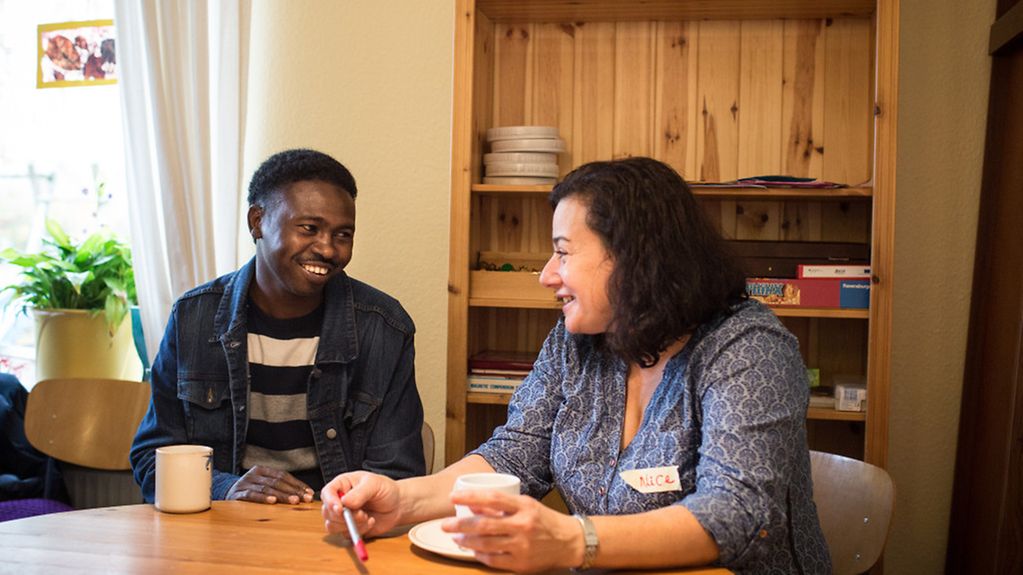Manuela Schwesig launches national programme
The programme "Menschen stärken Menschen" (people support people) is looking for guardians, mentors and host families for refugees. The Federal Ministry for Family Affairs is providing ten million euros for the programme.
3 min reading time

The new mentoring programme aims to help refugees find their feet in German society
Photo: Maria Feck
Federal Family Affairs Minister Manuela Schwesig explained that these personal contacts should make it easier for refugees to integrate.
Refugees coming to Germany need help to find their feet. A large number of people are already working as volunteers in this field. The new nationwide programme "Menschen stärken Menschen" aims to encourage people in Germany to mentor refugees, and to support these links. Ten million euros have been earmarked for this year alone.
"With the programme 'Menschen stärken Menschen' we want to help the families, the women, men and children who have come to us seeking protection, to find their feet in our society and to build a new future here," said Federal Minister for Family Affairs Manuela Schwesig when she presented the programme in Berlin. The programme, she added, provides a sound basis on which to forge many lasting personal links. This should benefit the refugees, the mentors and society as a whole.
There is a great will to help
The will to get involved is great in many places, but intermediaries are needed on the ground to bring together volunteers and refugees. Today charities and smaller voluntary initiatives such as Berlin’s "Start with a friend" are already doing valuable work here. Sarah Rosenthal launched this project last year with a few like-minded people in order to establish mentoring contacts between refugees and volunteers. The initiative has already brought together "tandems" as they call them.
It was through this initiative that Ramy Syriani and his German mentor Antonia Klein got to know one another. She is helping the 24-year-old Syrian, who arrived in Germany one and a half years ago, to learn German, deal with the authorities and find a flat. "It’s always easier if you have a friend," says the young man.
Most of the money under the nationwide programme is to be used to establish mentoring links and to provide training. Charities, migrants’ organisations, foundations and volunteers’ agencies are to place mentors. The funds will go to them. In that way it is sure that the volunteers are given professional support and that they can turn to these specialists if they have questions or problems. About 25,000 mentoring tandems are to be set up with the help of the programme.
Guardians and host families
As well as mentoring tandems, the programme hopes to attract voluntary guardians and host families for unaccompanied minors arriving as refugees in Germany. Last year some 59,000 children arrived in Germany as refugees without their parents. It is hoped that these people can help the young refugees cope with everyday life in the new environment, explained Manuela Schwesig.
Here too there is a lot of interests, as Monika Krumbholz explains. She works for "PiB – Pflegekinder in Bremen" (Foster Children in Bremen). It is important to talk to potential foster parents about what they are taking on, she points out. Some of the unaccompanied children have had traumatic experiences. And the visions of potential foster parents are sometimes quite different from the reality, said Monika Krumbholz. That is, of course, also true of the unaccompanied minors. A host family or a foster family is not the right option for all of them.
Telephone hotline opened
Manuela Schwesig stressed that smaller places far from the large cities would also benefit. "This nationwide programme is important to get the information and support out right across the country." In rural areas, in particular, volunteers cannot manage alone to put other volunteers in contact with refugees and to provide the advice and support needed.
The Federal Ministry for Family Affairs has opened a telephone hotline for anybody interested in becoming a mentor, a guardian or a host family. The hotline is open round the clock. Just call 0800 200 50 70 and staff will be happy to answer your questions and put you in touch with the right individuals, said Manuela Schwesig.